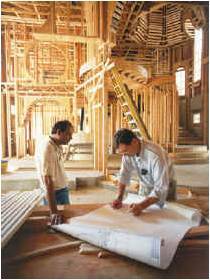A Virtual Construction Site in Architectural Technology
For more than seven years, I’ve taught in the Architectural Technology Program in cégep de Chicoutimi. It has always seemed important to me to stay in contact with the profession. It was precisely in that spirit that I undertook to create as real-life a situation as possible for my students during the modifications in the course dealing with site supervision which were part of the revisions being made to the architecture program in general.
Site supervision is a critical skill in our students’ training because they must be able to understand and supervise what is happening on-site. They must prepare documentation to ensure that the work detailed in plans and specifications which form part of the contract is carried out and be able to inspect what has been built. It was important for me that students experience the reality of the construction site and learn the importance of conflict resolution and document management. I saw role-playing as an excellent way to communicate these skills.
Always with an eye towards keeping the experience as real as possible,
A Forum for Role Playing
Always with an eye towards keeping the experience as real as possible, I organized the activity in the following manner. I begin by presenting information and documentation about site supervision in class. Among other materials, I use a PowerPoint presentation. Before starting the simulation, I quiz students about what they have learned ostensibly to verify their understanding of the concepts, but also as a way to make the construction site more and more of a reality. I then spend some time familiarizing students with the LEA learning platform where the role-playing exercise will take place, and then, it begins!
Naturally, this requires the creation of teams and the assignment of roles which include the contractor, the client, subcontractors and suppliers as well as the architect. I have, on occasion, assigned roles that seemed ill-suited to the student given that we can become someone different when playing a role. This facilitated conflict resolution and provided an opportunity for interpersonal skills acquired in other courses to come to the fore. For three weeks, students interact in their roles, experiencing site supervision in situations presented within an online forum.

Architects at work
The Teacher’s Task
To begin, I create scenarios for construction sites. According to the number of students, I can have four to six sites. I establish the initial situation, situations that occur during the work and the characteristics of the participants. During the exercise, it is absolutely essential to support students in their roles and avoid work stoppages or team breakdowns when problems cannot be resolved. To fulfill this task, I function as a consultant, responding to questions in the forum on a daily basis. The forum is also used to present events which influence the progress of the construction.
As for evaluation, overall performance is partially student determined in order to make the quality of entries and participation in the forum everyone’s affair. Given that so much of site management hinges on the use of standardized documents and regulations, I evaluate students individually on the basis of the documentation that they have produced during the role-play.
The Advantages
I appreciate teaching the use of forms in a real context rather than in an academic one. For students, the realism of the situation communicates the importance of site supervision and the importance of all of the players on the construction site.
Challenges and Changes to Contemplate
Here are some elements which could be improved in the future:
- Resolve hardware problems.
- Alternate role assignments given that they vary in importance.
- Lengthen the project to include other content.
- Use video teleconferencing or videos to show what happens on site.
- Evaluate using a blog for teambuilding.
One Student’s Opinion
This approach heightened my interest in the course. During a workshop for APOP in 2007, Antoine explained what he had gained from it as a student:
- At first, I had trouble understanding the activity, but using the forum helped me to see what had to be accomplished.
- This approach increased my involvement in the course.
- This activity showed things as they really are. I not only realized that site supervision wasn’t for me because of the paperwork, but that there were a lot of people involved who had roles of varying importance to play.
- I didn’t necessarily like the forum. I brought my portable computer to meetings which helped resolve problems.

